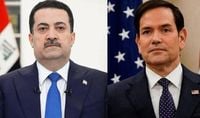In a recent phone conversation, Iraqi Prime Minister Mohammed Shia Al-Sudani and U.S. Secretary of State Marco Rubio addressed pressing security challenges, regional developments, and energy cooperation that are shaping Iraq’s current landscape. The dialogue underscored the complex interplay between maintaining national stability, protecting vital economic assets, and navigating geopolitical sensitivities.
Al-Sudani began by condemning a series of recent attacks targeting critical oil infrastructure in northern Iraq, specifically in the Kirkuk and Salah al-Din provinces. These strikes, he emphasized, were not random acts of violence but deliberate attempts to undermine Iraq’s national economy. The timing of the attacks was particularly notable, coinciding suspiciously with new agreements signed between the Iraqi Ministry of Oil and American energy companies to invest in oil fields within these regions.
“Iraq supports efforts to establish stability in the region and the sustainability of ceasefire agreements and the cessation of aggression,” Al-Sudani stated during the call, highlighting Baghdad’s commitment to peace and economic resilience. He expressed surprise at the coincidence of the attacks with the energy investment deals, suggesting a possible link aimed at destabilizing these efforts.
To counter these threats, Iraqi security forces are actively cooperating with the international coalition against ISIS to track down and apprehend those responsible for the attacks. This collaboration reflects a concerted effort to protect Iraq’s vital infrastructure and safeguard its economic interests.
Secretary Rubio responded with urgency, urging swift and decisive action to prevent further incidents. He stressed the importance of protecting facilities linked to U.S. interests and investments, underscoring the strategic partnership between the two nations. Rubio also pressed the Iraqi government to resume crude oil exports via the Iraq–Turkey pipeline, a critical route for Iraq’s energy exports, and to ensure that public employees in the Kurdistan Region receive consistent salary payments—an issue vital for maintaining social stability in that autonomous area.
The conversation also delved into the contentious draft law concerning the Popular Mobilization Commission (PMC), also known as the Popular Mobilization Forces (PMF). Al-Sudani described the legislation as a key component of the government’s broader security reform agenda. He emphasized that the PMF is an official Iraqi military institution operating under the direct authority of the Commander-in-Chief of the Armed Forces, reinforcing its legitimacy within the state’s security framework.
However, Rubio voiced concerns about the bill potentially legitimizing armed groups aligned with Iran, which could pose risks to Iraq’s sovereignty and complicate its internal security dynamics. This caution reflects ongoing tensions surrounding militia influence in Iraq and the delicate balance the government must maintain between integrating such forces and preserving national unity and independence.
The dialogue between Al-Sudani and Rubio encapsulates the multifaceted challenges Iraq faces as it seeks to stabilize its economy, secure its borders, and manage regional influences. The recent attacks highlight the vulnerabilities of Iraq’s energy infrastructure, a cornerstone of its economy, especially in the volatile northern provinces.
Moreover, the cooperation between Iraqi security services and the international coalition against ISIS demonstrates Iraq’s commitment to combating extremist threats that continue to plague the region. The coordination is crucial not only for immediate security concerns but also for fostering an environment conducive to economic development and foreign investment.
On the economic front, the new agreements with American energy companies signal a significant step toward revitalizing Iraq’s oil sector. These investments are poised to enhance production capacity in Kirkuk and Salah al-Din, regions rich in oil reserves but historically challenged by instability and conflict. The disruption caused by the attacks, therefore, represents a direct challenge to Iraq’s economic recovery and growth ambitions.
Rubio’s insistence on resuming exports through the Iraq–Turkey pipeline and ensuring salary payments in the Kurdistan Region further underscores the interconnectedness of economic stability and political cohesion. The Kurdistan Region’s autonomous status and its relations with Baghdad have long been delicate, and consistent government support is essential to prevent unrest and maintain unity.
The discussion about the Popular Mobilization Forces law reveals the ongoing debate within Iraq about the role of militias in the country’s security architecture. While the government seeks to formalize and regulate these groups as part of its security reforms, external actors remain wary of their potential to act as proxies for foreign interests, particularly Iran’s. This tension illustrates the broader regional complexities Iraq must navigate, balancing internal reforms with external geopolitical pressures.
Al-Sudani’s framing of the PMF as an official military institution underlines Baghdad’s intent to centralize control and integrate these forces into the state’s legitimate security apparatus. Yet, Rubio’s concerns highlight the persistent skepticism and the need for transparency and accountability in these reforms.
Overall, the phone call between Al-Sudani and Rubio serves as a microcosm of Iraq’s current challenges and opportunities. The country stands at a crossroads, striving to secure its economic future through energy development and foreign partnerships while confronting security threats and internal political complexities.
As Iraq continues its efforts to stabilize the region and protect its national interests, the cooperation between Baghdad and Washington remains a critical factor. Both leaders demonstrated a shared commitment to addressing security risks, supporting economic growth, and managing the delicate balance of power within Iraq’s security forces.
In the face of ongoing attacks and political debates, Iraq’s path forward will require careful navigation, steadfast governance, and continued international collaboration. The recent dialogue between Al-Sudani and Rubio reflects a mutual recognition of these imperatives and a determination to work together toward a more stable and prosperous Iraq.

